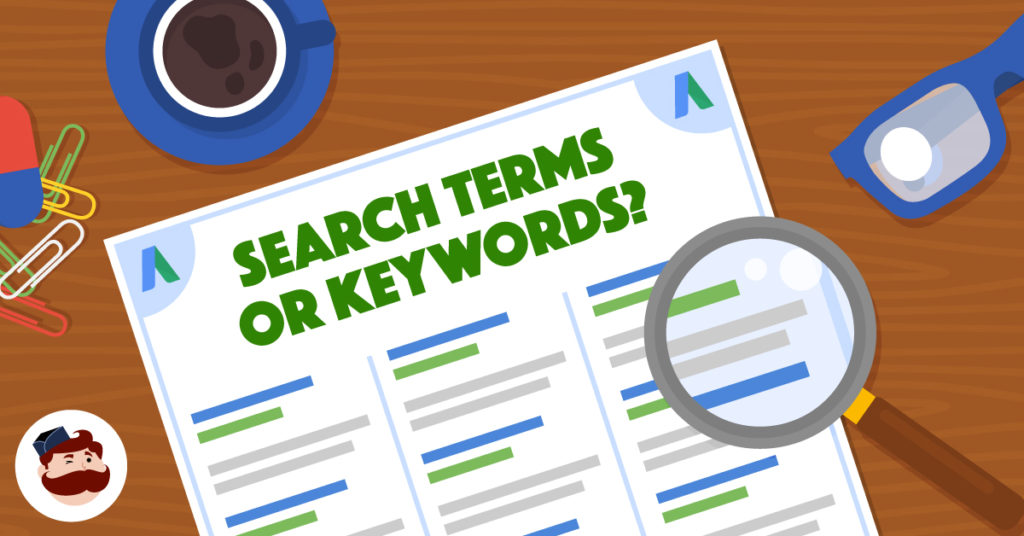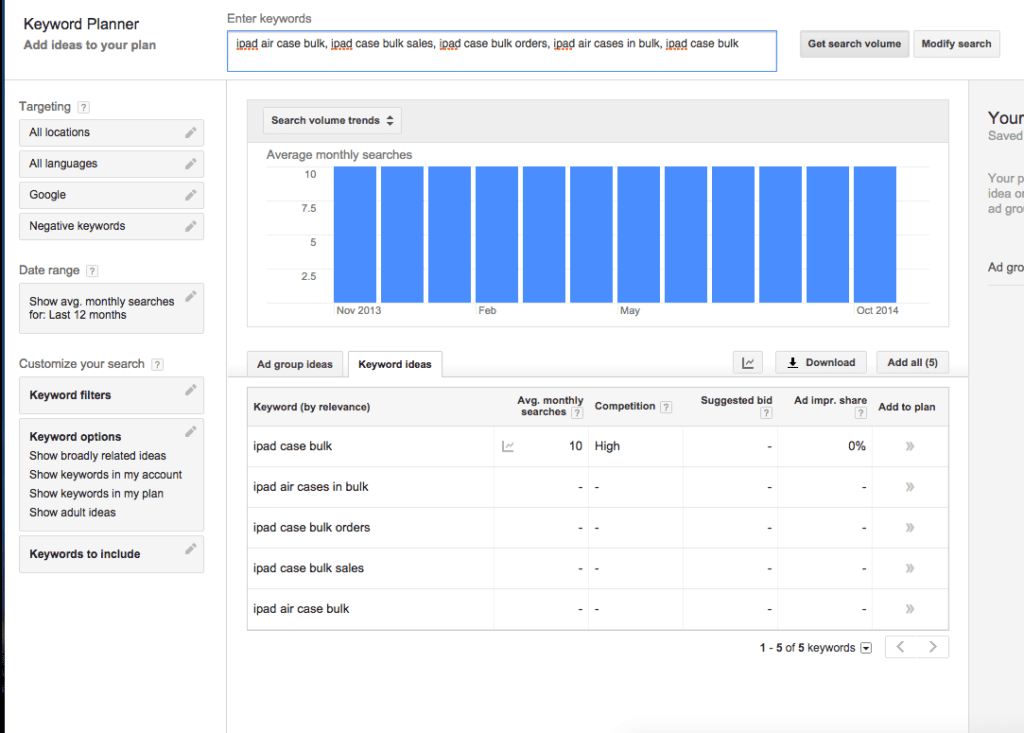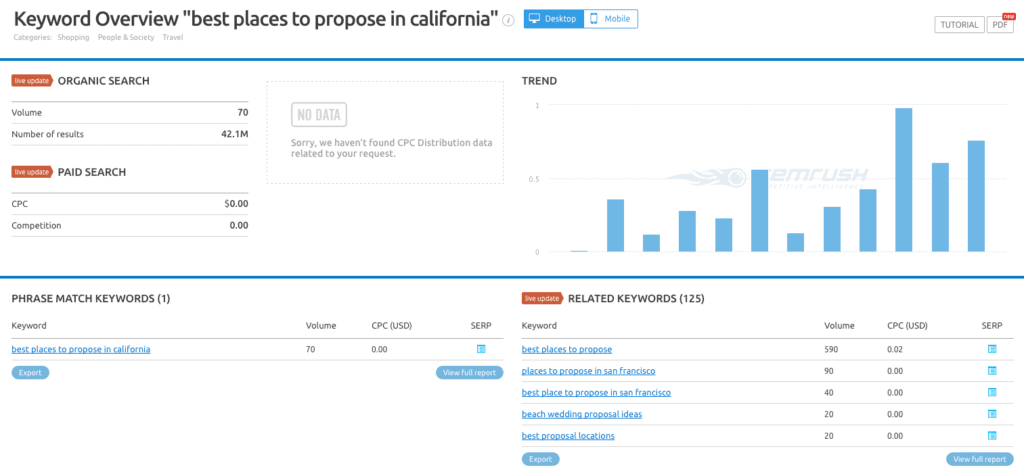Most people obsess over their AdWords keywords.
Bid $XX on “SEO Agency” and watch the leads come running on in, right?
Wrong.
Those specific keywords aren’t what you are really paying for.
More often than not, it’s also not what people are actually searching for.
And that slight difference is critical for campaign performance and your ROI.
When you aren’t paying for specific keywords, you’re at risk of paying for things you don’t want or need.
Here’s why paying for search terms matters and what you can do about it.
What is the Search Terms Report, Really?
It’s common to start with keywords when you begin a new AdWords campaign.
For example, many people start by using the AdWords Keyword Planner to get some basic, generalized keyword ideas:
Most people then turn to SEMRush or another PPC keyword tool just to get a second opinion.
With that research, you start creating new ad groups on AdWords. Soon enough, campaigns are off the ground and running. You’re starting to drive sales, leads, and conversions.
But if you don’t know about the search terms report, you’re out of the loop.
You’ll find the search terms under the keywords tab in your AdWords dashboard:
So, what exactly are search terms? And what’s the difference between search terms and keywords?
Let me explain:
Keywords are what you are bidding on.
For example, a typical keyword like “seo agency” costs about $25.90 per click on average with AdWords.
The cost of that is so high because tons of advertisers are bidding on it and are willing to pay that much for per click due to the profitable nature of landing a client.
Landing a single SEO client could mean thousands in profit each month. So paying $25 per click is actually reasonable.
But that’s not what you’re really paying for. That’s a blanket, generalized keyword.
It all comes down to match type.
The extensive match types in AdWords determine which search terms you show up for (and thus, what you pay for).
Using the example directly from AdWords, you could be bidding on “women’s hats” but show up for “buy ladies hats” due to broad match.
Broad match is set as the default match type that AdWords assigns to all keywords you bid on. Meaning your ad will show up for misspelled words, related searches, and more.
Due to this, you aren’t only paying for your keywords. You’re bidding on them, but that allows you to show up for diverse searches. And those clicks from variant searches are what really cost you money.
To see this firsthand, locate the search terms report in your AdWords dashboard and see which terms you show up for. This will show you the direct costs of each keyword that results in a click:
That’s what you’re paying for.
And knowing this information can often lead to some critical questions like:
- Why am I paying for random terms?
- How do I stop paying for specific searches?
- How does this impact my costs and my data?
Let’s recap real quick:
Keywords: specific industry phrases that you bid on with AdWords. For example, “seo agency,” bidding at $25 per click.
Search terms: what real people on Google are searching that, based on match type, Google will show your ad for. Each click costs you money.
Now that you know this crucial distinction, what impact does it have on your campaign and budget? Let’s discuss.
Search Terms Kill Your Bottom Line and Your Data
Knowing that you pay for search terms and not keywords instantly brings up a few scary implications that we need to address.
If you’re not paying for those specific keywords, what the heck are you paying for?
When you look over your search terms report, anything on there that is driving a click is costing you cold, hard cash.
Meaning every useless search term could be impacting your bottom line.
Even the most obscure search terms or off-brand queries could be costing you money.
Or potentially explicit searches could be getting you in trouble with Google.
While working on dozens of client campaigns, it was commonplace to see countless competitors showing up in search term results:
Now, while driving clicks on AdWords from competitor branded searches might seem like a great thing, it almost never is.
Why? You’re paying for clicks that will almost never convert.
For instance, that image above. That’s over fifteen bucks wasted on clicks that didn’t convert. And that’s only for the first two terms. That report contains thousands upon thousands.
Why is this so likely a waste of money?
Well first off, the searcher conducted a branded search. Meaning they are pretty far down the typical sales funnel/buyer’s journey.
They know the brand by name. They’ve done the research. They didn’t type in your brand or a generic industry term.
Converting for them is a step away. So if they search for your competitor and click on you, the chances are high that they’ll just bounce in a few seconds, costing you a potentially expensive click.
Not only does funnel stage play a big role, but studies also show that over 71% of the clicks on a given page go to organic search.
Chances are, searchers are skipping your ad and scrolling to the organic listing of the brand they searched.
So not only are clicks wasted (sometimes), costing you money, but your campaign performance is now off, too.
You’re getting impressions from people who will never buy from you.
That means your click-through rate isn’t accurate. And your conversion rates are messed up, too.
If anyone did click, they immediately realized it wasn’t what they searched for. It was a different brand.
That’s a bounce. And that bounce messes up your AdWords data and your Analytics data.
Since those clicks were likely never going to convert, it’s only throwing your data off and costing you more money that you could spend better elsewhere.
Thankfully, AdWords offers a way to combat the negative side effect of search terms…
Negative Keywords are Your Best Friend
Luckily, AdWords doesn’t leave us in the dust when it comes to the search terms report. We don’t have to simply buck up and pay for things that aren’t driving sales.
Using negative keyword lists, you can filter out any junk that isn’t converting, ensuring that you don’t show up for those searches ever again.
Simply browsing the search terms report and clicking on each search term will allow you to add them as negative keywords.
If you notice that tons of keywords are driving clicks but not conversions, you can quickly put them on your negative keyword list and be done with them.
But, if you want to get more specific and really optimize your negative keyword lists, you can use match types.
The three match types to be concerned with when using negative keywords are:
- Exact
- Negative
- Phrase
Let me give you examples of each.
Exact: exact match is just what it sounds like: you don’t show up for that exact phrase, but it doesn’t eliminate the phrase when other words are involved. The exact match type for negative keywords looks like this:
-[keyword].
Any time you take a term from the search terms report and use the exact match keyword type, you will never show up for that exact search.
For example, if you used -[seo], you would never show ads on a search for “seo” on Google. But, you would show up for “seo agency” or anything that includes “seo” along with any other word or word combinations.
You can use this best for extremely broad terms like “seo” where there are countless competitors and little intent to buy services.
Broad: broad match means you won’t show up for that search even if the words are ordered differently. For example, adding seo agency to your negative keywords list without any quotes or modifiers will eliminate you from showing up for any searches where the words seo and agency appear in the same search.
It can be great for ruling out major topics that aren’t of interest to your campaigns.
Phrase: lastly, we have phrase match. You can indicate phrase match by using quotation marks. This will eliminate all searches that contain your exact combination of words in the same order that you type them in.
For example, using “seo agency” on a negative keyword list would indicate phrase match type. Using this match type, you won’t show up for any searches that use the words “seo agency” side by side. So if the search is something like “best seo agency california,” you won’t show up. But if the search is “best agency seo california,” you would show up since it’s ordered differently.
While you can simply go through the search terms report and use the auto-adding feature, I recommend using match types to ensure that you don’t weed out too many search terms.
Search terms are valuable pieces of data, and you want to make sure that you only eliminate unnecessary ones.
Some great negative keywords to add to any account include (but aren’t limited to):
- Free (unless you offer free consultations or trials)
- Anything related to explicit content (pornography, etc.)
- Anything illegal (illegal sites, downloads, torrents, etc.)
Adding negative keywords like this takes only a few minutes, and it eliminates any potential risk of someone associating your site with content that could destroy your reputation.
Turn Search Terms into SKAGs for Big Wins
This has been a dreary post so far. Bottom lines getting messed up. Data getting skewed. It’s starting to sound like AdWords is a living, breathing nightmare.
But AdWords isn’t all bad. And just because there can be some terrible search terms, that doesn’t mean there aren’t just as many great ones.
Sometimes, search terms reports can be goldmines of data. When bidding on keywords, they are usually rigid. For example, “online courses.”
That’s pretty generic. Let me show you with an example. These are the results for a search for online courses:
It’s all university-based courses. But what if you’re showing up for “create training courses” like Litmos?
Or “create online courses” like Podia?
Or “host your online course” like Kajabi.
Now you see critical differences that could make or break a campaign.
If you’re showing up on a search for “create online courses” but you’re showing a generic ad that just says “online courses” without specifying “creation,” you’re in hot water.
And that’s where SKAGs (single keyword ad groups) come into play.
They look like this:
Using three match types for a single keyword and giving it its own ad group allows you to get specific.
When you don’t use SKAGs, you risk running generic ads that try to appeal for too many keywords:
According to a Clicteq and ConversionXL study, SKAGs can increase your CTR by 28.1% and improve quality scores dramatically.
Comb through the search terms report to find any search terms that have converted.
If you see any with conversions at a solid cost per conversion, add them as new single keyword ad groups.
Now you can effectively create multiple ads for each SKAG. Meaning you don’t have to just create two generic ads for “online courses,” but you can create specific ads for creating, hosting, and training online courses!
You can avoid generalizations and get specific. After all, the searcher knows what they are looking for. Otherwise, they’d have searched for a generic term. But they didn’t. And it’s your job as the advertiser to match that need.
Use SKAGs to do that more effectively.
Conclusion
Most people think that keywords are what they pay for on AdWords. But in reality, search terms are what cost you money.
Due to search modifiers, this means that you can show up for nearly any keyword, such as competitor brand names and random terms that barely relate.
All of these often negatively impact your bottom line, and each click will cost you. These problems can even impact your CTR and conversion rate.
But search terms aren’t all bad. By using negative keywords, you can virtually eliminate any wasted ad spend and stop showing up for searches that won’t convert.
So yes, obsess over keywords. But not at the expense of your search terms.














Nice article, Brad.
Wondering if you have any tips on managing/improving efficiency with Skag?
I follow your blog regularly and got great information. Thanks for an insightful post.These tips are really helpful. Thanks a lot.Keep it up.Keep blogging.!!
Appreciate your posting this useful post. I’m a long
time reader but I’ve never been compelled to leave a
comment. I bought to your site and distributed this in the fb.
Thanks again for a great post!
Trying to dive deeper into understanding adwords, and reading this blog post helped a lot. Thanks!
really helpful to a beginner|! Thanks!
We have to be very careful when selecting the keywords for our campaigns. If we choose the keywords with wrong user intent then we might lose and waste the budget. The search terms reports are very helpful for identifying the wrong keywords for our campaigns. I made use of it when the last time I was promoting my blogging guides on Google Ads.
Hi. Hope you are good .such an informative article. Keep it up. After reading this article I would like to share my opinion. With tomorrow’s ads and Google ads, you can increase sales for your business by quickly and easily advertise your website in Google Search. You can create a thoughtful campaign with effective advertising. They will appear in Google search and attract the right people in time for your website.